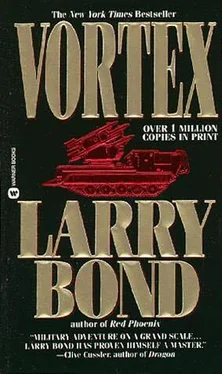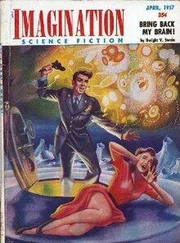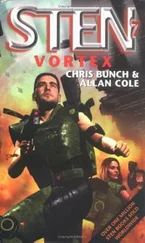Once past this small spur of residential development and the racetrack, the ground sloped down toward a small stream before rising again into the city proper. Church spires and the tower of a Moslem mosque were sharply outlined against the treelined escarpment.
Terrific. A single rifle company couldn’t even begin to cover that much territory.
“We’re going to need some help on this, One Two.”
“Understood.” Another brief pause while the battalion CO evidently tried to unscramble what had suddenly become a very confused situation.
“Alpha and
Charlie companies are closing on your position now. Plus Brigade has released another platoon of LAVs and some M60s for support. I’m shifting the HQ forward now, so hold up until we get there. “
“Will do.” Ziss saw a medic go by at the run, medkit and bandages in hand.
Oh, Christ. He’d almost forgotten about his wounded.
“I need a dust-off here, One Two. I’ve got several wounded for immediate evac. “
“Roger that. Dust-off is already en route. ETA is five minutes. ” His commander’s businesslike tone shifted, becoming more concerned.
“Hang on,
Jon. We’re coming. Out. “
Ziss acknowledged and signed off, not sure which of the two emotions warring within him was stronger-relief now that help was on the way, or irritation at being treated a little like a panic-stricken teenager. He handed the mike back to his radioman and moved off in search of his platoon leaders. They had some planning to do.
“Captain!” He hadn’t taken more than five or six steps when Pitts caught up with him.
“Rover Three One reports hostile movement on the western slopes of Signal Hill.” Rover Three One was the call sign for one of the recon teams scouting the ground in front of Bravo Company.
Signal Hill? Now just where the hell was that? He flipped open a tattered topographical map. There it was. A nine hundred-foot high, wooded hill just west of the city. He almost smiled. The Afrikaners were starting to show themselves. Fine. Time for an air strike. He grabbed the handset again.
“Mike One Two, this is BravoA sudden loud popping sound made him look up just as a
window in a nearby house shattered. And for the second time in only a few minutes, Ziss threw himself prone.
“Sniper! Hit the dirt! “
He wriggled back to the line of rose bushes as M16s opened up from houses all around-punching rounds in the general direction of Pietermaritzburg.
The company’s M60 machinegun teams were next, indiscriminately hosing down buildings and treetops that might conceal Afrikaner troops. Parked cars hit by gunfire started going up in flames.
Capt. Jon Ziss gritted his teeth and checked the clip in his own rifle.
This was going to be one bitch of a day.
DECEMBER 27-FORWARD HEADQUARTERS, ALLIED EXPEDITIONARY FORCE, TOWN
HILL, NORTH OF PIETERMARITZBURG
Town Hill rose nearly nine hundred feet above the Natal lowlands, and more than three hundred feet above Pietermaritzburg’s central business district. For years, the city’s wealthiest families had been building their homes on its slopes, drawn by its spectacular views and easy access to the Durban-Johannesburg highway. And now the same factors made Town
Hill the perfect site for the forward headquarters of the Allied expeditionary force.
In the middle of a street once reserved for Mercedes and other luxury automobiles, four camouflaged command vehicles sat parked back-to-back in a rough circle. Tarpaulins covered the open spaces between them, essentially creating a single large headquarters tent. Staff officers from two countries and all four branches of the armed forces crowded the tent-receiving reports from fighting units scattered all across South
Africa, planning the next day’s operations, and generally getting in each other’s way.
Lt. Gen. Jerry Craig stood outside, ignoring the controlled chaos of his forward HQ. His binoculars were focused on the N3 Motor Route as it wound northwest through a narrow valley. He frowned. Right now the road looked more like a serpentine parking lot than a superhighway.
Long columns of trucks, APCs, and other vehicles were backed up all the way south through the city-evidently brought to a dead stop by more fighting somewhere up ahead. An ambush? More harassing fire from South African heavy guns? A roadblock? Craig shrugged. It didn’t really matter. What did matter was that Vorster’s troops were slowing his advance to a nightmarish crawl.
Just securing Pietermaritzburg had taken a full day, three infantry battalions, air strikes, artillery bombardments, and dozens of casualties.
Since then, his men had been forced to fight for every kilometer they gained on the only main road from Natal to Pretoria.
The pattern was always the same. Units moving along the highway would take sudden fire from enemy troops hidden on a hill, behind a ridge, or in a side canyon. In response, they had to deploy off the road, call in air or artillery to pound suspected Afrikaner positions, and then peel off platoons or companies to drive any survivors back into the mountains.
Craig lowered his binoculars and shook his head in frustration. There were enough trails and dirt roads running through the Drakensberg to support small Afrikaner units operating against his flanks-but not enough to sustain his own, larger force. Getting to Johannesburg and Pretoria with a powerful mechanized army meant driving straight up the
N3.
Two AV-8B Harrier jump jets suddenly howled past at low altitude, heading for a battlefield somewhere farther along the highway. Bombs bulked large beneath their stubby wings.
Craig silently urged the Harrier pilots on. C’mon, boys, give the bastards hell, but give it to them fast.
Time, as always, was an enemy. His intelligence officers claimed that the
Cubans weren’t advancing any faster. But the Cubans were just 160 kilometers away from South Africa’s capita) and its richest minerals complex. His own troops were still more than 500 kilometers away. You didn’t have to be a mathematical genius to realize that was a prescription for a losing race.
The sound of squealing brakes drew his attention away
from his strategic problems. He turned around. A U.S. Army Hummvee had just pulled up in front of his improvised command tent.
The Hummvee’s sole passenger, a dapper, bantamweight general whose gray, crew-cut hair still showed flecks of black, climbed out and headed straight for him. The man’s lean, suntanned face showed signs of intense anger and irritation.
Craig stood his ground, preparing himself to exercise a little-used virtue-patience. Holding a unified command sometimes meant having to coddle and cajole fractious subordinates from all the service branches.
He returned the other man’s rigid salute.
“Sam.”
“General. “
Uh-oh. Formality between near-equals almost always spelled trouble.
“What can I do for you?”
Maj. Gen. Samuel Weber, commander of the 24th Mechanized Infantry
Division, tried valiantly to keep the anger out of his voice. He failed.
“I’d like to know why the ships with my tanks are still sitting off the goddamned port. I’ve got a hundred and fifty MI tanks out there-all set to come ashore and blow the shit out of these frigging Boers. And I’ve got the crews to man ‘em, but they’re just sitting on their butts at Cape
Town waiting to fly in to the airport here. So what gives?”
Craig bit back the first words that came to mind. Treating a two-star
Army general like an unruly Marine second lieutenant probably wouldn’t be the best way to foster interservice cooperation. He took a deep breath and let it out slowly.
“The engineers have only been able to clear enough room to dock one ship at a time, Sam. And right now I need that space to off-load mote essential material.”
Читать дальше












